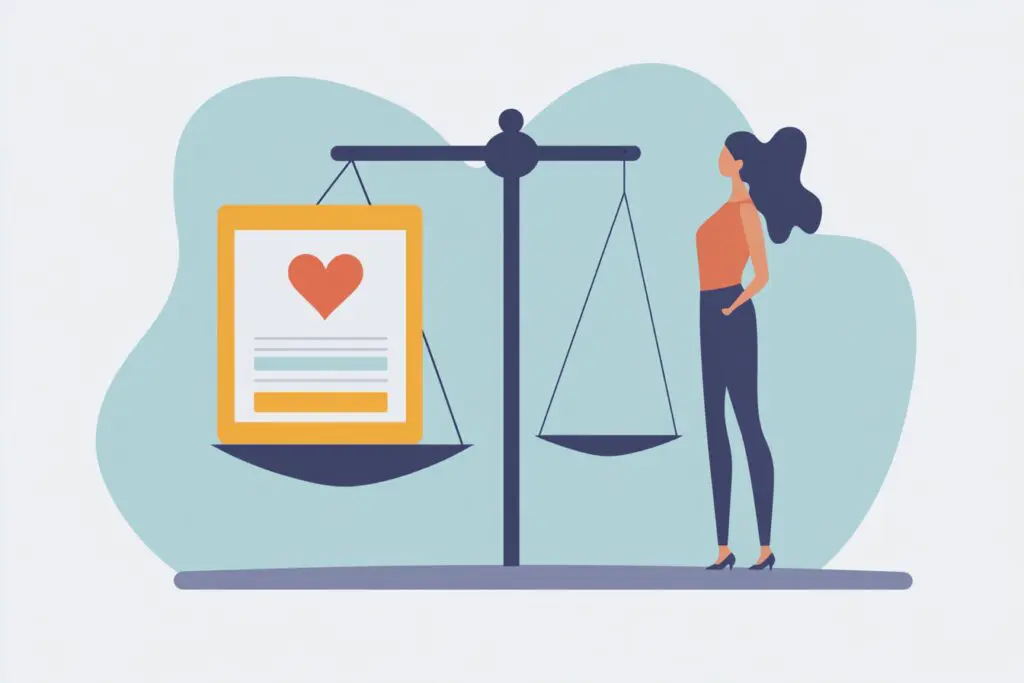The wine was lukewarm. It tasted like disappointment. Across the table, a guy who looked great in his photos was launching into his hot take on a recent Supreme Court decision. It was our first date. It was also our last. Driving home, replaying the conversational nosedive, I wasn’t just annoyed. I was exhausted. All I could think was, I wish I had known sooner. This feeling is probably familiar. These days, our political and personal lives are tangled together, which makes the question of whether to put your politics on a dating profile one of the biggest headaches for modern women.
It’s a total tightrope walk. On one hand, you could waste another precious evening on a date that was doomed from the start. On the other, you might shrink your dating pool to nothing, invite a bunch of angry messages, or get swiped left on for a single word. This goes deeper than just checking a box for “Democrat” or “Republican.” It touches on your fundamental worldview, your sense of human rights, and what you want your future to look like. So, what’s the move? Do you use your profile as a sharp, efficient filter to weed out the mismatches right away? Or do you leave it open, hoping to find a real connection beyond the political labels?
Key Takeaways
- Putting your political views on your profile can be a powerful filter, saving you time and emotional energy by weeding out incompatible matches early.
- Sharing your political stance can spark more substantive conversations and attract people who already get your core values, fostering a deeper connection from the jump.
- Then again, being politically loud might seriously limit your dating pool, especially if you live in a politically mixed area, and it could invite hostile messages from people looking for a fight.
- You can signal your values without using overt labels by mentioning specific causes, volunteering, or using photos that tell a story about your worldview.
- Ultimately, the decision comes down to your dating goals. It all depends on how tied politics are to your identity and whether you’d rather have a big pool of options or a smaller, more ideologically aligned one.
Is Putting Politics on Your Profile the Ultimate Time-Saver?
We’re all so busy. Between work, friends, and just trying to keep a plant alive, who really has time for dates that go nowhere? For a lot of women, being upfront about politics isn’t about ideology. It’s about ruthless efficiency.
Can a single line on your bio save you from a dozen bad dates?
You bet it can. I think back to that lukewarm wine date and so many others. Those were hours of my life I’ll never get back. Hours spent listening to opinions that made my skin crawl. Had I seen “apolitical” or a differing political stance on his profile, I would have swiped left. Zero hesitation. It’s not about being closed-minded.
It’s about knowing yourself. You know what you can and cannot live with in a partner. Putting a political identifier in your bio—whether it’s a party, a viewpoint like “pro-choice,” or just “liberal”—acts as a bouncer for your DMs. It turns away the people who were never going to make it past the velvet rope anyway. It saves you makeup, gas money, and the mental drain of faking interest.
Are you filtering out potential partners or potential headaches?
Let’s be real about this. The big fear is always that we’re “filtering out” some amazing person who just happens to vote differently. But what are we really filtering? A lot of the time, it’s not just a person. It’s a future filled with arguments over the news at dinner. It’s tension during holidays with the family and deep disagreements on how to raise kids. You’re filtering out the constant headache of having to defend your beliefs. You’re filtering out the emotional labor of teaching a partner about issues that are central to your existence. It’s a preemptive strike against years of future conflict.
What if your core values are non-negotiable?
For so many of us, politics isn’t a casual interest like hiking or a preference for pineapple on pizza. It’s the very foundation of our core values. Your beliefs about racial equality, LGBTQ+ rights, bodily autonomy, and climate change aren’t just “opinions.” They are moral stances. When your politics are tangled up with your ethics, sharing them on your profile is an act of integrity. It simply says, “This is who I am. This is what I believe in.” If someone swipes left on that, they were never your person to begin with. You can’t build a relationship on a foundation where one person doesn’t see the other’s humanity as valid.
How much does political alignment really matter for long-term compatibility?
It matters more than ever. In today’s hyper-polarized world, political affiliation has become a kind of shorthand for our deepest values. The disagreements aren’t just about tax policy; they’re about human dignity. And this isn’t just a hunch; research is starting to back it up. For instance, a study from Stanford University found that political polarization is directly shaping our romantic choices, with more and more people unwilling to date someone from an opposing party. For a relationship to last, you need a shared vision of the world—or at least deep respect for each other’s vision. That shared vision often starts with politics.
But Could You Be Sabotaging Your Own Love Life?
The time-saving argument makes a lot of sense. It’s clean and logical. But is it too simple? The heart is a messy thing, and human connection is rarely so black and white. You have to wonder if by laying all your political cards on the table, you might be folding a winning hand before the game even gets going.
Are you accidentally shrinking your dating pool to a puddle?
This is the big one. It’s a totally valid concern. Depending on where you live, stating you’re a liberal in a mostly conservative town—or the other way around—can feel like you just cut your potential matches by 80%. It’s discouraging. The algorithm might even show you fewer people. If your main goal is just to meet as many people as possible and you’re open to different perspectives, being politically explicit could be a huge mistake. You might be missing out on some truly great people who are just outside your declared circle.
What if your perfect match has different political views but similar core values?
Here’s where it gets tricky. Political labels are clumsy, imperfect boxes to put complicated people in. Is it possible for someone to call themselves a “moderate” but still be kind, generous, respectful, and a feminist in his actions? Yes. Could he vote a certain way because of a single issue, like economics, but share 90% of your social values? Also yes. By drawing a hard line on your profile, you kill any chance of finding that out. You lose the opportunity for a conversation where you might discover you connect on a human level that the labels could never predict.
Is a political label on a profile just asking for a fight?
Sometimes, yeah. I learned this one the hard way. A few years back, I added one of Hinge’s political stickers to my profile. The number of my matches didn’t just dip; the whole vibe changed. I started getting messages from men who clearly hadn’t read a single other thing about me. They just wanted to argue. They saw a political opponent to be defeated, not a person to connect with. It was exhausting and, honestly, a little creepy. Your profile becomes a beacon, and it doesn’t just attract your people; it can also attract trolls who live for conflict.
Could you be misjudged based on a single word like “liberal” or “conservative”?
Stereotypes are a beast. The word “liberal” might create an image in someone’s head that has absolutely nothing to do with you. They might assume you’re anti-this or pro-that without ever reading your prompt about how much you love your dog or your passion for baking. It goes for “conservative,” too. These words are heavy. They carry a ton of cultural baggage. You risk being flattened into a caricature before you even get to say hi. You’re letting someone else’s assumptions define you, and that’s a tough way to start.
Finding the “Just Right” Approach: How to Signal Without Shouting
Maybe the choice isn’t so stark. It doesn’t have to be “declare everything” or “say nothing.” Maybe there’s a middle ground—a way to hint at your worldview with a little nuance, attracting the right people without waving a giant political flag.
Is there a way to show your values without slapping on a party label?
Totally. In many ways, this is the more skillful approach. It’s about showing, not just telling. Instead of a label, you use the rest of your profile to paint a picture of what you believe. This method trusts that the person swiping is smart enough to connect the dots. It’s less of a bouncer at the door and more of a secret handshake. It invites curiosity rather than an immediate judgment. This approach lets your values unfold naturally, which can feel much more genuine.
Could mentioning specific causes you care about be more effective?
This is my personal favorite strategy. It’s specific, it’s positive, and it’s based on action. Instead of the broad and often loaded label “liberal,” what if your profile said you’re “passionate about environmental justice” or “spend my weekends volunteering at the local animal shelter”? This gets your values across in a way that’s both clear and personal. It gives a potential match a real thing to ask you about and shows that your beliefs aren’t just ideas.
Here are a few ways to phrase it:
- “Looking for someone who is as passionate about fighting climate change as I am.”
- “My ideal Sunday involves a farmers’ market trip and then volunteering for voting rights initiatives.”
- “A big part of my life is my work with social justice organizations in our community.”
- “Ask me about the non-profit I support that focuses on education reform.”
This swaps a potentially divisive label for a vibrant snapshot of who you are.
What kind of photos signal your political leanings?
Your photo gallery is valuable real estate. Don’t waste it. A picture of you at a Pride parade, a climate march, or wearing a t-shirt for a specific cause says a lot without a single word. It puts your beliefs into a real-world context. It’s a powerful way to signal your affiliations because it feels authentic—it’s just a part of your life. Just know that this can be as explicit as a written label, but it shows you as an active, engaged person, not just a political designation.
How can your prompts and answers reveal your worldview?
Those dating app prompts are golden opportunities. When an app asks, “What are you passionate about?” don’t just put “tacos.” Use that space. Be real. An answer about wanting to see more women in leadership, the importance of community support, or your admiration for a specific public figure is a smart, nuanced way to signal your social leanings. It sparks conversation around shared ideals, which is a much better place to start than a shared political party.
Navigating the Conversation: What Happens After the Match?
Whether you put it on your profile or not, the topic is probably going to come up. The way you handle it can make or break everything.
So you matched with a political opposite… now what?
First, just breathe. If you decided not to filter upfront, you were open to this happening. So get curious. Ask open-ended questions. Something like, “I saw you listed yourself as moderate; I’m curious what that means to you,” will get you a lot further than, “How could you possibly vote for that person?” The goal isn’t to change their mind. It’s to understand them. You might find out that their life led them to a different conclusion than yours. Or you might find an unbridgeable gap. Either way, curiosity will get you a real answer faster than judgment will.
When is the right time to bring up politics if it’s not on the profile?
There’s no perfect time, but I’m a big believer in “sooner rather than later.” Maybe not on the first date, unless it just comes up. You want to establish a basic human connection first. But if you’re feeling a real spark by date two or three, it’s fair to bring it up. Waiting for months to discuss something so fundamental is just setting yourself up for heartbreak. You can ease into it, maybe by talking about a current event or a documentary you just watched. See how they react. Their reaction to the topic is often more telling than their actual opinion.
What’s the difference between a healthy debate and a relationship red flag?
A healthy debate is all about mutual respect. Both people are listening, asking questions, and trying to understand, even if they disagree. No name-calling. No trying to make you feel stupid. A red flag is when a discussion becomes a personal attack. If your date is belittling you, being dismissive (“you only think that because you’re a woman”), or getting weirdly angry, that’s not a political problem. That’s a character problem. It shows a massive lack of respect and emotional control, and that will ruin a relationship no matter what your politics are.
Can you really “agree to disagree” on fundamental issues?
This is the big one, isn’t it? You can agree to disagree on tax policy. You can agree to disagree on infrastructure spending. But can you agree to disagree on whether certain people deserve rights? On bodily autonomy? For most women, the answer is a hard no. These aren’t abstract debates. They have real consequences for us and the people we care about. You have to know your own non-negotiables. Recognizing that some differences just can’t be bridged is a powerful form of self-respect.
The Personal Stories: What Do Other Women Say?
In the end, this stuff is personal. Here are a few stories from the trenches.
Remember Sarah, who found her husband because they both had “BLM” in their profiles?
This is the dream. A friend of mine, Sarah, had been slogging through the apps for years. She was sick of it. She decided to just be herself, unapologetically, and put “BLM” and “Feminist” right in her bio. The number of her matches dropped, sure, but the quality went through the roof. One of the first guys she matched with after that was Michael. His profile was just as clear. Their first date wasn’t some cautious interview; it was an excited conversation between two people who already knew they were on the same team. They got married last year. For them, being upfront was the key.
What about Emily, who realized her “moderate” match was anything but?
Emily matched with a guy who listed himself as “moderate.” He seemed charming. The banter was great. Then, on their third date, he started making “jokes” that were just racist and misogynistic comments with a laugh track. When she called him on it, he said he was just “politically incorrect” and that she was too sensitive. That “moderate” label had been a mask. It was a harsh reminder that labels can be misleading. It made her realize she needed to be more direct with her questions early on.
How did my own experiment with putting “Feminist” in my bio turn out?
After the flood of debate-bros, I took all political labels off my profile. I went quiet for a few months. The dates were fine. Just fine. But something was missing. The connection felt shallow. So I tried something new. Instead of a party sticker, I just added one word to my bio: “Feminist.” It was my little test. The result was fascinating. The angry trolls mostly vanished. Instead, I got messages from men who either called themselves feminists too or were respectfully curious about what it meant to me. It became a fantastic conversation starter and led to some of the best, most respectful dates I’ve ever had. It was my perfect middle ground.
Can dating across the aisle actually work in 2025?
It’s harder than ever. Is it impossible? I don’t think so. It would require two people with superhuman communication skills, deep empathy, and a foundation of respect strong enough to withstand a hurricane. It’s rare. And it’s not a project you can take on. You can’t change a person. But if you happen to find that rare soul and you’re both up for the work, it could be amazing. For most of us, though, finding alignment is the simpler path to a happy, peaceful life.
So, What’s the Final Verdict for Your Profile?
After going through all of this, you might be looking for a single, easy answer. I wish I had one. The truth is, the right strategy is yours and yours alone.
Is this a question of if you should share, or how?
For most women who feel their politics are a part of them, it’s not a question of if you should signal your values, but how. Do you want the direct, no-nonsense filter of a label? Or do you prefer the subtle, conversation-starting approach of mentioning causes and using your photos to tell the story? Both are good strategies. The key is to be intentional. Don’t just pick a label or leave your profile blank without thinking. Decide what you want to communicate.
How does your location change the equation?
Where you live matters. A lot. Dating as a liberal in New York City is a totally different world than dating as a liberal in rural Alabama. In a place where everyone thinks like you, being explicit might not change a thing. In a politically mixed area, it could be the difference between hundreds of matches and a handful. You have to be realistic about your environment and decide if you’re okay with dating in a much smaller pond to find someone who really gets it.
Ultimately, what kind of partner are you really looking for?
This is the most important question. Take a second. Really think about it. Your answer will tell you what to do with your profile. Be brutally honest with yourself about what you need in a partner to feel safe, respected, and happy.
- Are you looking for a life partner to go to marches with, someone who will get angry about the same headlines over coffee?
- Are you open to being challenged by different views and think that political diversity might actually make your life richer?
- Is your main goal right now to have fun, meet a ton of different people, and not take it all so seriously?
- Are you dating with a list of non-negotiable values that a partner absolutely, positively must share for it to work?
There are no wrong answers. But your answer will tell you whether to filter or to discuss. Your dating profile is your ad to the world. You get to decide what it says. Make it a real reflection not just of who you are, but of the kind of love you hope to find.
Frequently Asked Questions – Politics on a Dating Profile

How should women decide whether to reveal their political views on their online profiles?
Women should consider their personality, tolerance for conflict, platform, goals, and what feels authentic and manageable for themselves, recognizing that the best approach varies based on individual circumstances and the platform used.
What are the risks associated with sharing political views on one’s online profile?
Sharing political views can expose women to unwanted arguments and harassment, lead to misinterpretation of subtle signals, and require emotional labor to handle backlash or questions, which can be mentally and emotionally taxing.
What are some subtle strategies women can use to hint at their political views without full disclosure on their profiles?
Women can use subtle cues such as quotes, photos at rallies, interests in social causes, value statements like kindness or science, issue-specific mentions, humor or satire, profile photo clues, and testing the waters in early conversations.
Why might some women prefer to keep their political views private on their online profiles and discuss them later?
Women might prefer to keep politics private initially to avoid snap judgments, focus on shared humanity first, keep profiles light and fun, prevent nuance loss in bios, avoid being defined solely by politics, and keep options open for respectful dialogue.
What are the main reasons women might choose to display their political views upfront on their online profiles?
Women may choose to display their political views openly to quickly filter out incompatible matches, save time and energy, demonstrate authenticity, attract like-minded individuals, signal safety, and showcase their broader values and personality.




